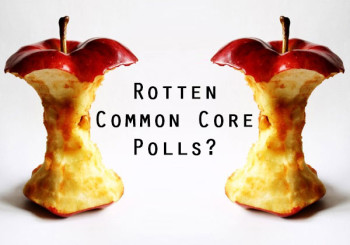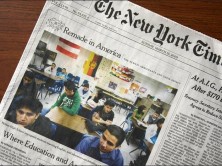
(iMediaEthics Illustration; Apple Core image by Roger Karlsson via Flickr)
Recently NPR reported on the results of two different national polls on the American public’s views toward the new Common Core curriculum. A PDK/Gallup poll, conducted in May and June of this year, showed opposition by almost two-to-one, 60 percent to 33 percent. A poll for a Harvard journal, Education Next, conducted in the same two-month time frame, found two-to-one support, 53 percent to 26 percent.
How does a seasoned journalist handle such contradictory results? The reporter in question, Cory Turner, asked the logical, if supposedly rhetorical, questions: “Can both polls be right? Can a majority of Americans oppose and support the Common Core?”
It turns out the questions are not rhetorical after all. In response to both questions, Turner says, “In a word: yes!”
O.K., so now we know we’re in Polling Land, where up is down, rationality is trumped by gut feeling, and all polls are “right” regardless. If there are differences in poll results, it’s not because the polls are wrong, but because of question wording, or slightly different dates of interviewing, or … whatever.
What’s Turner’s justification for saying both polls are right? “When it comes to polling, a word can make all the difference.”
Yes, the Gallup question was different from the EdNext question, which suggests that Gallup was measuring something different from EdNext. But how does that resolve the contradiction – that PDK/Gallup reports clear majority opposition to the Core Curriculum, while EdNext reports clear majority support?
The polls may have been measuring different phenomenon, but the reports of the polls each claim to be measuring the same thing. No matter our faith in numbers, it should not blind us to the sheer logical impossibility – that a clear majority of Americans simultaneously supports and opposes the Core Curriculum.
Surely, at the very least, one of the polls is wrong. Or maybe both are.
I opt for both.
Widespread Ignorance of Common Core Standards
Both polls suggest that at least half the public has little to no idea what the Core Curriculum is all about. PDK/Gallup found just 17 percent of Americans saying they had heard “a great deal” about the new “Common Core State Standards,” with another 30 percent saying they had heard “a fair amount.” A majority, 53 percent, said they had heard only a little (34 percent) or nothing at all (19 percent).
EdNext asked respondents a somewhat different question: “Before today, have you ever heard of the Common Core State Standards?” A clear majority, 57 percent, said no. Only 43 percent said yes. But having heard of the policy doesn’t mean that 43 percent actually know what the provisions are.
In fact, EdNext shows how little those people know about the issue. The poll asked that same group whether it was true or false that “the federal government requires all states to use Common Core standards.” The right answer is “false,” but only a third of respondents who had heard of the policy got the right answer.
The poll also asked if it was true or false that “Under common core standards, states and local districts can decide which textbooks and educational materials to use in their schools.” The right answer is “true,” but just under half of the respondents who had heard of the policy knew that.
EdNext then asked the same respondents how knowledgeable they felt overall about the Core Curriculum. Just 44 percent said they were “very” (7 percent) or “somewhat” (37 percent) knowledgeable, with the rest admitting they were “not very knowledgeable” or “not at all knowledgeable.” The 44 percent who are at least “somewhat” knowledgeable among the 43 percent who had even heard of the core curriculum, suggests fewer than one in five Americans claims to know very much about the issue.
The results from both polls, despite the different approaches, provide us a roughly similar picture of how ill-informed the public is. A little under half of the public has even heard about the Core Curriculum standards, but only a much smaller proportion – maybe about one in six Americans, according to Gallup; or one in five, according to EdNext – has heard enough to form a meaningful opinion about the policy.
Why Both Polls Are “Wrong”
So, how can both polls report such a large proportion of the public with opinions? The answer is simple: The poll questions pressure respondents to express an opinion, even if they haven’t a clue about the issue. Respondents acquiesce, making snap decisions based on the way the question is worded, just as NPR’s Turner points out. In addition, not mentioned by the reporter, responses are often very much influenced by the many other questions that are asked before the major policy question.
The EdNext poll, for example, posed more than twenty questions about education policy before asking about the Core Curriculum, including a question that asked whether teachers’ tenure should be based on how well their students performed on “state tests.” Having primed respondents to think about accountability, the poll then asked:
“As you may know, in the last few years states have been deciding whether or not to use the Common Core, which are standards for reading and math that are the same across the states. In the states that have these standards, they will be used to hold public schools accountable for their performance. Do you support or oppose the use of the Common Core standards in your state?”
To respondents who had never heard of the Core Curriculum, the proposal was clearly positive. In fact, according to EdNext, when the “Common Core” words were dropped (for half the sample), support rose from 53 percent to 68 percent for the concept of similar state standards. Clearly, people liked the standards because they provided school accountability.
But do they like the actual “Core Curriculum” itself? The truth is, most people don’t know what it is. So their answers in this poll have more to do with the biased question wording, emphasizing school accountability, than with the new academic standards.
Unlike the EdNext poll, the Gallup/PDK survey apparently asked just two prior questions: How much people had heard about the Common Core standards, and where they had obtained their information. But the third question had its own bias. It asked, “Do you favor or oppose having the teachers in your community use the Common Core Standards to guide what they teach?”
Notice here there is no mention of accountability. Instead, the question falsely implies that teachers will be forced to teach what people outside the community have dictated. That doesn’t sit well in principle, so people who don’t know what the Core Curriculum is all about will tend to react negatively.
Also, the question is forced-choice (not offering the respondent a “don’t know” or “unsure” option), which pressures the respondents – even those who have just admitted they’ve never heard of Common Core – to come up with an opinion. And Gallup was successful. Despite a majority of respondents unaware of the new standards, and only 17 percent saying they knew a great deal about them, 93 percent expressed an opinion about the policy.
Creating “Public Opinion” on the Core Curriculum
Given how few people know anything about the new education standards, the polls showing most people with meaningful opinion are at best misleading. The polls give the illusion of an opinionated public by first giving respondents information and then treating their snap, top-of-mind expressions as though they represent the views of the public at large.
But the public at large has not heard the biased questions of PDK/Gallup or EdNext, and – for the most part – remain blissfully unaware of the Core Curriculum. The respondents in the poll samples no longer represent the general public, because they have been manipulated in a way the general public has not.
As the report of the EdNext poll acknowledges, the low level of public information about the issue indicates “that the debate over the Common Core has yet to register in the minds of many Americans.”
Yes…despite polls like PDK/Gallup and Ed/Next, most Americans aren’t engaged in the issue and don’t have meaningful opinions about it. Polls can create the illusion of public opinion, by asking biased questions of their respondents, but we shouldn’t treat either set of results as “right.”
And only in Polling Land could we conclude that both are right.





Comments Terms and Conditions